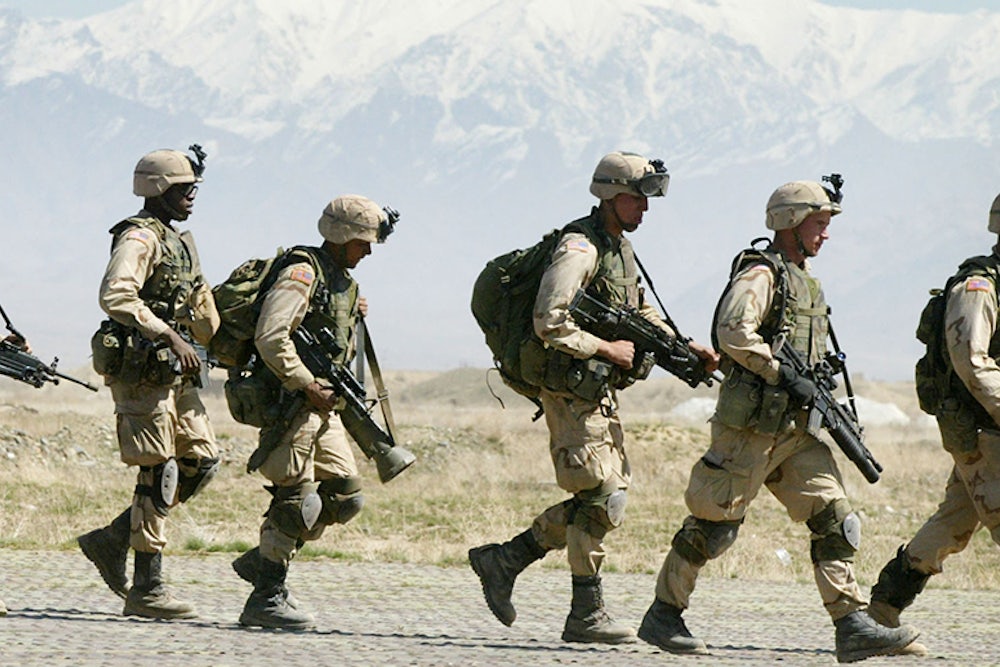“I want to see some history!” So went Johnny Rotten’s desperate plea in 1977. But the front man for the Sex Pistols, cursed in so many ways, was not cursed with living in especially interesting times. We are. And, yes, it’s all been very adrenalizing, to the point of downright exhilaration and even mass delirium. But, for all the cheap speechifying about civic vigor and American cohesion, September 11 was a curse. Nothing more.
In the direct aftermath of September 11, policy- and opinion-makers acted in ways that responded to multiple needs unrelated to that day. They were bored by the “democratic malaise” into which Christopher Lasch, writing in 1995, believed the country had descended; or deeply suspicious of the Hegelian teleology embedded in Francis Fukuyama’s The End of History; or downright scornful of the Clinton-era cliché that soft (i.e., economic) power had supplanted hard (i.e., military) power. And they wanted, like Johnny Rotten before them, to see some history.
None of this, to be clear, meant that someone ginned up the war on terrorism to get a buzz. The country’s elite was making a virtue of necessity, not the other way around. Still, the notion that September 11 would and should lead to newfound national purpose, to a reengagement with history, was widespread. In the ephemeral aftermath of September 11, George Will noted, and Charles Krauthammer celebrated, the end of America’s “holiday from history.” The point was clear: Fukuyama was wrong; September 11 had given the engine of history a jumpstart. To all of this, President Bush added his own commentary: “For too long, our culture has said, ‘If it feels good, do it.’ Now, America is embracing a new ethic and a new creed: ‘Let’s roll.’”
But, over the past ten years, America, or rather most Americans, did not reengage with history. Why? Put aside whether the wars we got were the wars we were promised. They were never our wars to begin with. “The communal march against an enemy generates a warm, unfamiliar bond with our neighbors, our community, our nation, wiping out unsettling undercurrents of alienation and dislocation.” Those are the words—the concession, really—of Chris Hedges, a war correspondent-cum-antiwar correspondent. A mountain of social science data and historical evidence from past U.S. conflicts exists to bolster his contention. Yet the aftermath of 9/11 was different: It turned out that our wartime sense of civic and national responsibility no longer extended very far. With the coming of an all-volunteer military in 1973—applauded at the time as a gesture of heightened moral awareness—the definition of American citizenship narrowed to the point of excluding any obligation to defend the Republic. So, in 2001 and the years after, only a thin demographic slice, disproportionately composed of small-town Americans, went off to fight. The insult to New York was avenged by the children of Texas. Those kids were, and remain, knee-deep in history—coordinating airstrikes, cajoling tribesmen, calling in medevacs. This, even as the nation they purport to defend has opted out of history, anesthetizing itself with Abilify and reruns of “The Real Housewives.”
Aside from the limiting effect of limited war, there was something even more fundamental on the table: In their contentment with the humdrum routines of post-historical America, our countrymen may have possessed more good sense than their would-be elites. There was always something crummy about the portrayal of war as a means of reengaging with history and renewing national purpose, recalling as it did the exhilarating spirit of 1914. For whatever war’s civic effects might have been, they paled next to its carnage. They still do. Whatever war may or may not do for the body politic, one really ought to weigh this against what it does to actual bodies. At a distant remove, Americans made this calculation, and they somehow did so sooner than, say, the nearly two years in Iraq that it took this writer to tote up the same pros and cons. On filthy streets, in blood-spattered helicopters, at funeral processions, I registered the costs and benefits, the tidy methodologies and the obscene realities. And, like most Americans, I finally made my choice: If this is history, change the channel.
This piece ran in the September 15, 2011, issue of the magazine.
